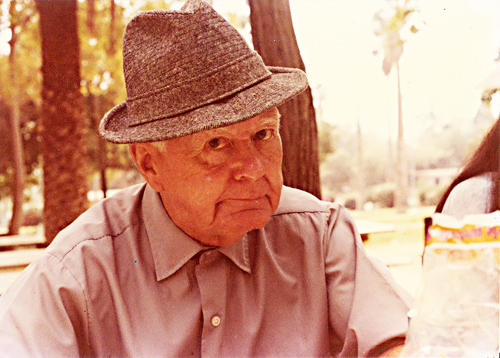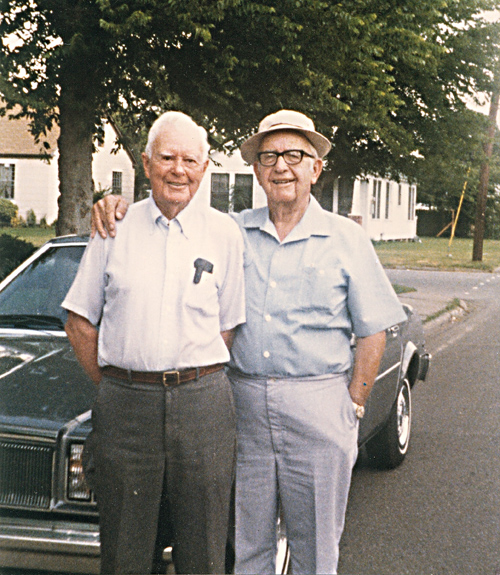A PROUD SON PAYS TRIBUTE TO A KIND AND RESPECTED FATHER
By Bob Vickrey
Everyone always knew where they could find my father.
Most days he could be found in the backyard leaning on his garden hoe in a relaxed, contemplative pose. His tranquil demeanor revealed a man who appeared to be at peace with himself and the world.
He maintained the even, steady temperament of someone content with his life.
His innate kindness was palpable – people sensed that about him immediately.
He was known for his patience and never seemed to be in a hurry. For a man who was once the fastest sprinter in East Texas – and had the state track medals to prove it – he moved at his own pace regardless of the situation.
He had a deep and abiding love of nature and a genuine appreciation for the land.
That appreciation for the land came naturally while growing up on a farm in Groveton, a few miles northeast of Houston in the Piney Woods near Lufkin.
Irian Laurence Vickrey was born the seventh of ten children into a family that learned the hard-scrabble life of farming in their small East Texas town. During World War I, several of his older brothers served in the military, and it became necessary for him to occasionally miss school and help with family chores on the farm. However, he did graduate from Groveton High and continued working the fields while attending nearby Rusk College.
I often kidded Dad about his unusual first name and suggested that his parents had run out of names by the time he was born. He told me that before high school graduation he was already known simply as “Vick.”
During the early 1940’s, he and my mom settled in the small booming industrial community of Galena Park, located along the shores of the Houston Ship Channel, where they raised their three children. In succeeding decades, their work in church, school, and civic activities eventually earned the respect and admiration of an entire community, as evidenced by the huge crowd of well-wishers that turned out for Dad’s 90th birthday celebration in 1989.
His farming background was likely what had given him a genuine reverence for the natural world. At times, when I watched him leaning forward on all-fours working the soil of his flowerbeds, it seemed his pose almost resembled a meditative ritual.
His real job was at Armco Steel where he worked the evening shift in the payroll department, but those extra available daylight hours at home gave him ample time to work in his garden.
He once raised a wide-ranging vegetable garden, but in later years was satisfied to tend his roses, strawberries, and flowering shrubs. He carefully placed pine straw from nearby trees underneath each strawberry plant in order to prevent mildew. During infrequent winter freezes, he covered them with the same straw, protecting the plants overnight. He gently tended them as if they were his children.
My mother contributed to the gardening as well. She had a great fondness for flowers, and the two of them could often be seen working side-by-side, as she trimmed and watered, while my dad loosened the soil around their roots. Neighbors routinely stopped by to admire their handiwork.
After my dad’s retirement, he could be spotted in the late afternoons sitting out back under a shade tree with his next-door neighbor and lifelong friend Marion Willard.
To suggest that their conversation was relaxed, would qualify as major understatement. It went something like this:
“So, Vick, it sure is a hot one today.”
(Pause…)
“Yep, they say we’re in for a long spell.”
(Longer pause…)
“Did you hear that Claude Bell is in the hospital?”
(Another pause…)
“Maybe we should go visit him this evening.”
(Pause…)
“Your car or mine?”
Companionship came easy for him – and with few wasted words. Theirs was the timeless tale of long-lasting loyalty and friendship. There was a trust that he engendered in the company of others that allowed friends to share the small moments of their lives with him freely and easily.
He tolerated the political ranting of his youngest son, but would occasionally bring his calm and patient style to quell the uprising. I remember pontificating once about something that our President had done, and he calmly said, “Bob, he’s doing the very best he can do.” The pure innocence of his comment essentially ended my spirited rant.
Perhaps that is why I yearn for his calming voice during this maddening presidential race, in which angry and mean-spirited rhetoric is reaching near-hysterical levels. His sense of kindness and fair play would hardly be appreciated in the current political arena.
During my college years, Dad helped me land a summer job in the payroll office at Armco Steel where he had worked for so many years. I often heard tributes from his fellow employees who shared their memories of working with him, but shortly after announcing his retirement, one testimony in particular stood out above the rest.
A tall, grey-haired African-American man approached me one day outside the office with his hand extended. “I’m told that you’re Mr. Vick’s son.” I nodded. With a slight crack in his voice and with misty eyes, he said, “Mr. Vick is simply the kindest man I have ever known, and I just hope you know that about your daddy.” With that, he turned and walked away.
That singular moment gave significant pause to this once rebellious son, and those words have resonated with me for a lifetime.
Even after all these years since Dad has been gone, it comes as little surprise that when one of my friends occasionally calls me “Vick,” I instinctively swell with pride.
Bob Vickrey is a writer whose columns appear in several Southwestern newspapers including the Houston Chronicle. He is a member of the Board of Contributors for the Waco Tribune-Herald and a regular contributor to the Boryanabooks website. He lives in Pacific Palisades, California.
Comments
Leave a Reply
You must be logged in to post a comment.






